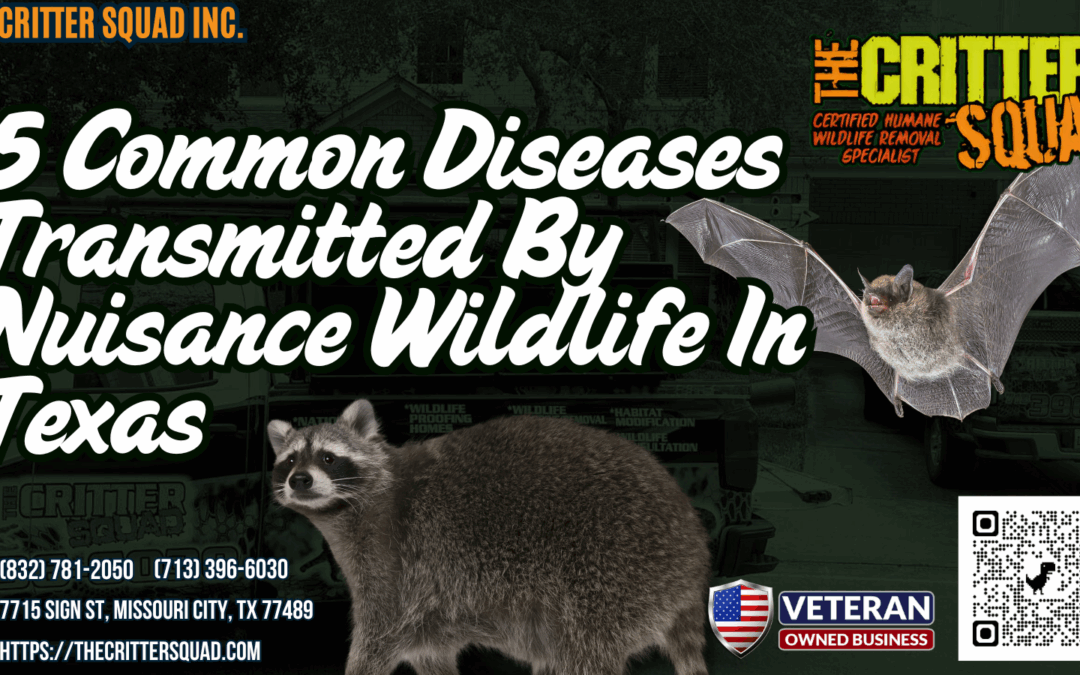Nuisance wildlife in Texas can transmit serious diseases to humans. Common diseases include rabies, which causes aggression and confusion. Hantavirus, spread by rodents, leads to fever and difficulty breathing. Leptospirosis occurs through contaminated water and can cause flu-like symptoms. Tularemia arises from contact with infected animals, causing fever and swollen lymph nodes. Salmonella is linked to contaminated food and results in gastrointestinal issues. There are more important details surrounding these diseases worth discovering.
Key Article Highlights
- Rabies: Transmitted through bites from infected wildlife, causing aggression and confusion; vaccination for pets is essential for prevention.
- Hantavirus: Spread by deer mice, symptoms include fever and shortness of breath; avoid contact and seal rodent entry points to reduce risk.
- Leptospirosis: Bacterial infection from contaminated water or soil; good hygiene and protective clothing are vital during activities like swimming.
- Tularemia: Contact with infected animals can lead to this serious bacterial infection; wear gloves when handling wildlife to minimize exposure.
- Salmonella: Often linked to contaminated food and wildlife; practice safe food handling and wash hands to prevent foodborne illness.
Rabies
Rabies is a serious disease that affects many wildlife species in Texas. It is most commonly found in animals like bats, raccoons, and foxes. The symptoms of rabies can include aggression, confusion, and difficulty walking. Infected animals may also show signs of excessive drooling or biting. People can become infected through bites or scratches from these animals. Rabies prevention is vital for both humans and pets. Vaccination for pets is an important step in preventing the spread of the disease. Additionally, avoiding contact with wild animals helps reduce the risk of exposure. Understanding raccoon behavior can help you recognize potential risks of rabies transmission. If bitten, it is essential to seek medical attention immediately. Awareness and simple precautions, such as humane bat removal, can protect against rabies in Texas. Recognizing signs of rabies in wildlife, like unusual activity or disorientation, can also be critical for safety.
Hantavirus
Wildlife in Texas is not only a source of rabies but also carries other diseases, including hantavirus. This virus is mainly spread by rodents, especially deer mice. Hantavirus can lead to serious health issues. Common hantavirus symptoms include fever, muscle aches, and difficulty breathing.
To protect against hantavirus, it is important to take preventive measures.
| Hantavirus Symptoms | Hantavirus Prevention |
|---|---|
| Fever | Seal up rodent entry points |
| Muscle aches | Keep food stored securely |
| Headaches | Clean up droppings safely |
| Shortness of breath | Use traps for rodents |
| Coughing | Avoid contact with wild mice |
Awareness and action can help reduce the risk of hantavirus in Texas.
Leptospirosis
Leptospirosis is a bacterial infection that can be transmitted through contact with water or soil contaminated by the urine of infected animals. Common symptoms include fever, chills, headache, muscle aches, and sometimes a rash. In severe cases, it can lead to liver damage or kidney failure. People can become infected while swimming, wading, or working in water that may be contaminated. To reduce the risk of leptospirosis, individuals should practice good hygiene, avoid contact with potentially contaminated water, and wear protective clothing when necessary. Keeping living areas clean and free of rodent infestations can also help prevent the spread of this disease. Awareness and simple prevention measures are key to staying safe from leptospirosis.
Tularemia

Although often overlooked, tularemia is a serious bacterial infection that can affect humans and is primarily transmitted through contact with infected animals or their environments. Common symptoms of tularemia include fever, chills, and swollen lymph nodes. People can become infected by handling sick animals, being bitten by ticks, or inhaling contaminated dust. To prevent tularemia, it is important to avoid contact with wild animals, particularly rabbits and rodents, which are common carriers. Wearing gloves when handling animals and using insect repellent can also help reduce the risk. Maintaining cleanliness in areas where wildlife may roam is essential for tularemia prevention. Awareness and caution can protect individuals from this potentially severe disease.
Salmonella
Salmonella is a type of bacteria that can cause foodborne illness in humans. It often spreads through contaminated food or contact with infected wildlife. Common symptoms include fever, diarrhea, and stomach cramps.
| Salmonella Symptoms | Salmonella Prevention | Sources of Infection |
|---|---|---|
| Fever | Cook food thoroughly | Wild animals |
| Diarrhea | Wash hands regularly | Contaminated water |
| Stomach cramps | Avoid cross-contamination | Unwashed fruits/vegetables |
To prevent salmonella, it is important to practice safe food handling. This includes cooking meats properly and washing hands often. Awareness and vigilance are key to reducing the risk of infection from this dangerous bacteria.
Frequently Asked Questions
How Can I Tell if an Animal Is Rabid?
To determine if an animal is rabid, one should observe symptoms of rabies such as aggressive behavior, disorientation, or excessive drooling. Rabies prevention includes staying away from wild animals and vaccinating pets regularly.
What Are the Symptoms of Hantavirus in Humans?
Hantavirus symptoms often start with fever and muscle aches. Notably, about 38% of hantavirus cases result in severe respiratory issues. Human transmission occurs mainly through contact with infected rodent droppings or urine. Awareness is essential.
Can Pets Contract Leptospirosis From Wildlife?
Pets can contract leptospirosis through wildlife exposure. To guarantee leptospirosis prevention, pet owners should limit their pets’ contact with wild animals and maintain good hygiene practices. Awareness of risks helps protect beloved pets from this disease.
How Is Tularemia Treated in Humans?
Tularemia symptoms can feel like a thousand tiny daggers. Treatment in humans typically involves antibiotics, which help fight the infection. Prevention includes avoiding contact with infected animals and practicing good hygiene to stay safe.
What Precautions Should I Take During Outdoor Activities?
During outdoor activities, individuals should prioritize outdoor safety by remaining aware of wildlife. Wearing protective clothing, staying on marked trails, and avoiding contact with animals can help guarantee a safe and enjoyable experience in nature.




























